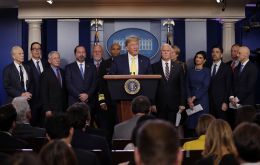MercoPress. South Atlantic News Agency
Economy
-
Thursday, March 12th 2020 - 07:48 UTC
With local elections looming, Brazilian congress overturns Bolsonaro veto on social spending

Brazil's Congress overturned a presidential veto on Wednesday in an ongoing battle over appropriations with President Jair Bolsonaro, doubling social assistance for elderly and disabled people that will cost an extra 20 billion reais (US$ 4.2 billion) this year.
-
Thursday, March 12th 2020 - 07:35 UTC
Coronavirus: Bank of England cuts interest rate 50 basis points to 0.25%

The Bank of England (BOE), the UK's central bank, cut interest rates by 0.5 percentage points on Wednesday morning as part of an emergency response to the coronavirus, or COVID-19.
-
Wednesday, March 11th 2020 - 08:55 UTC
Brazil downplays the threat of coronavirus: “it is overstated”

Brazil President Jair Bolsonaro minimized the threat of the new coronavirus - which has killed nearly 4,000 people in more than 60 countries and tanked global financial markets, saying its destructive power has been “overstated”.
-
Wednesday, March 11th 2020 - 08:49 UTC
Oil prices with slight recovery on Tuesday but market volatility remains

Oil, which plunged about 25% on Monday, rebounded on Tuesday along with equities and other financial markets. Brent futures rose US$2.69, or 7.8%, to US$37.05 a barrel by 2:24 p.m. EDT (1824 GMT), while U.S. West Texas Intermediate (WTI) crude rose US$2.73, or 8.8 percent, to US$33.86.
-
Wednesday, March 11th 2020 - 08:45 UTC
Corporate America rushes to borrow money in anticipation of a major economic downturn

From Exxon Mobil Corp to Royal Caribbean Cruises Ltd, companies rushed to borrow more money and boost their cash coffers on Tuesday, as the market turmoil fueled by a plunge in oil prices and the global coronavirus outbreak raised the prospect of an economic downturn.
-
Wednesday, March 11th 2020 - 06:39 UTC
Airfreight in Asia skyrockets as Chinese industry restarts with passenger flights grounded

Airfreight rates are skyrocketing after the grounding of many passenger flights in Asia has left shippers scrambling to book limited spots on cargo planes as Chinese industrial production restarts, according to industry insiders.
-
Tuesday, March 10th 2020 - 18:01 UTC
Argentina ready to begin restructuring of US$ 70bn in foreign law bonds

Argentina will revamp as much as US$ 68.8 billion in foreign law bonds as it restructures its debt, the government said in a decree on Tuesday, paving the way for tense negotiations as the country looks to strike a deal with creditors this month.
-
Tuesday, March 10th 2020 - 08:20 UTC
Argentine risk jumps on Monday to a record of 2,768 points, not seen since 2005

Argentine risk spreads on Monday shot to levels not seen since 2005 and sovereign bond prices fell 7.5%, as the coronavirus slammed global markets and the cash-strapped country prepared to restructure debt.
-
Tuesday, March 10th 2020 - 08:15 UTC
Black Monday cocktail: oil price war and coronavirus trigger market panic

World oil prices crashed on Monday, fuelling a vicious selloff on stock markets that were already buckling from the spreading coronavirus outbreak. Stocks tanked as the global oil market nosedived 30% at one stage after top exporter Saudi Arabia slashed the prices it charges customers following a bust-up with Russia over crude production cuts.
-
Tuesday, March 10th 2020 - 08:10 UTC
Coronavirus overshadowing Trump's optimism with the economy and reelection campaign

Concern that president Donald Trump himself could be exposed to the coronavirus through contact with two Republican lawmakers loomed on Monday, on a day when US stocks plummeted, feeding growing national anxiety. Trump, who flew back to Washington after a weekend golfing at his Florida resort and having dinner with Brazil's president Jair Bolsonaro, has spent weeks dismissing the seriousness of the threat.
